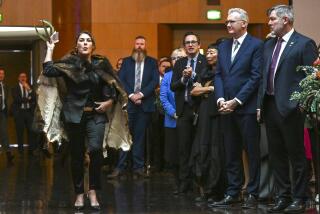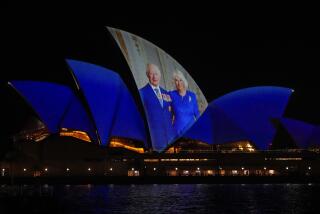Australian Aborigines Become ‘Exiles in Own Country’
- Share via
ALICE SPRINGS, Australia — Although they have lived in Australia for at least 40,000 years, the aborigines are not likely to play a major role in next year’s celebrations marking the nation’s 200th anniversary as a British convict settlement.
For one thing, they number only about half of what they were when the white men arrived in 1788. For another, Fay Nelson of the Department of Aboriginal Affairs said, they have little cause to celebrate.
“European occupation of Australia has devastated the aboriginal people and their culture,” Fay, an aborigine, said in an interview. “The aborigines are exiles in their own country.”
Even though the government has set aside land for them, “a lot of aboriginal people feel their land was simply stolen from them,” she said.
$1.6-Million Fund
She added that although most aborigines will find little to attract them in the 1988 celebrations, “inevitably there will be some who say, ‘OK, at least let’s see what we can get out of it.’ ”
Of the $130 million the bicentennial celebration is expected to cost, $1.6 million has been set aside for aboriginal events.
It has been estimated that before colonization, aborigines spoke about 260 distinct languages, with numerous dialects. Most of these are close to extinction, anthropologists say, and more than 50 have become extinct.
Now numbering 160,000, aborigines account for 1% of Australia’s 16 million people, half their estimated total when Australia was colonized.
Lost in ‘Dreamtime’
Anthropologists say that Australia’s indigenous natives have the longest continuous culture in the world but their roots are lost in the legend of the “dreamtime,” as aborigines refer to their earliest beginnings.
British colonization brought diseases that wiped out thousands of aborigines. Others were hunted like animals for sport, according to historical records.
Some people say the outlook is so grim for aborigines that even the boomerang, their traditional hunting weapon, will soon be a collector’s item.
“Their culture is dying out,” said Roy Frost, who travels countrywide buying aboriginal artifacts for his store in Alice Springs. “The stuff I’m selling now won’t be available in two years.”
Multiracial Society
Australia today is one of the world’s most multiracial societies, with more than 20% of the population made up of people born outside the country. But aborigines remain economically and socially disadvantaged, despite millions of dollars in government grants each year.
In 1986, funding to aboriginal communities totaled $150 million, on top of $216 million for projects started by the Department of Aboriginal Affairs.
A 1981 census found that 60% of aborigines were jobless, contrasted with a national unemployment rate of 8%.
Their earning capacity was shown to be half the national family average of about $8,000, while 2.5% had completed higher education, contrasted with the 16% national total.
Low Life Expectancy
Life expectancy, according to the Health Commission of New South Wales state, also is low. From birth, an aborigine can expect to live to 52, about 20 years less than an Australian of European descent.
A changing diet coupled with “desperate alcoholism” were found to be major factors for ill-health and short life spans, the commission said.
Among the young, sniffing gasoline is becoming a major social problem. In recent months, about 200 children have been treated in Alice Springs for detoxification from breathing fumes from cans of gasoline slung around their necks.
The federal government is pouring money into aboriginal communities for education and other programs, but few manage to join the mainstream of modern Australia.
First Aboriginal Judge
The country’s first aboriginal judge, for example, was appointed just last year.
However, aborigines have done well with land rights. They own 12.24% of Australia--363,063 square miles, about the size of Texas and New Mexico combined.
It has caused a white backlash, particularly in the Northern Territory, where aborigines, accounting for 24% of the 150,000 population, own 37% of the land and have claims pending to 14% more.
“We have two laws in this country, one for the aborigines and one for white Australians,” complained the Northern Territory’s deputy minister, Barry Coulter.
More to Read
Sign up for Essential California
The most important California stories and recommendations in your inbox every morning.
You may occasionally receive promotional content from the Los Angeles Times.













